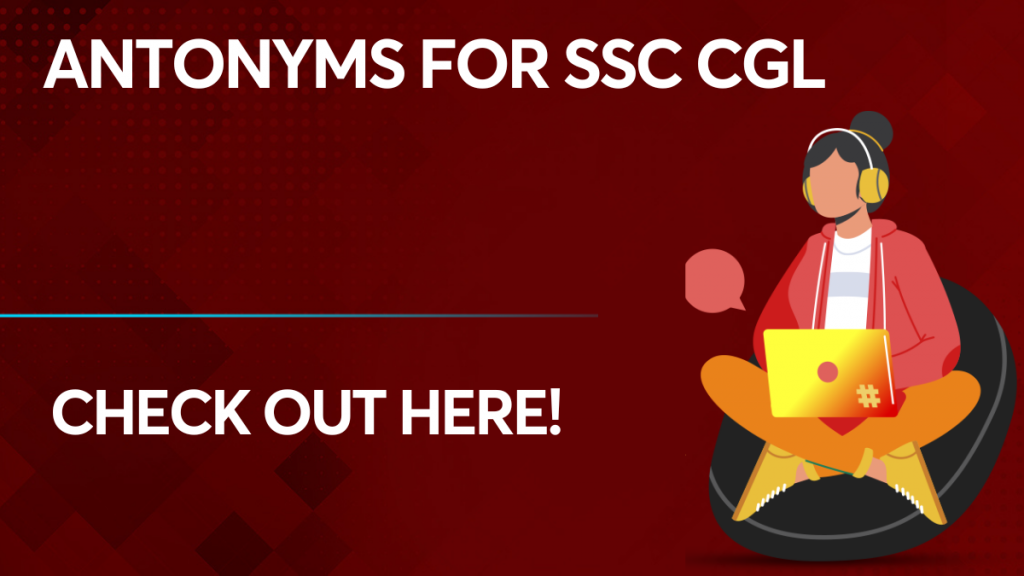Antonyms are words that have opposite meanings. The SSC CGL examination is one of the most sought-after exams for graduates seeking a career in government services. To excel in the exam, candidates must have a good command of the English language, which includes vocabulary. Antonyms are an essential component of English language skills and are frequently tested in the SSC CGL examination.
In this article, we will delve into the world of Antonyms for SSC CGL, why they are important, and how you can prepare for them to ace the exam. Read on to learn more!
Antonyms for SSC CGL:
Antonyms are a crucial component of the English language, and they are frequently tested in the SSC CGL examination. These questions require candidates to identify the opposite of a given word from a set of options. Antonym questions can appear in different sections of the exam, such as the English Language and Comprehension section, and candidates must be prepared to tackle them. To excel in antonym questions for SSC CGL, candidates must have a strong vocabulary and must be able to identify the correct opposite word.
In the following table, we have provided no.of questions asked in SSC CGL
| Name of the Topic | Number of Questions Asked |
|---|---|
| Synonyms/ Antonyms | 2-10 |
Download SSC CGL 2023 Notification PDF!
Know the Different Kinds of Opposite Words Tested in SSC CGL
Antonyms are words that have opposite meanings. They are an important component of the English language, and their understanding is crucial for candidates appearing in the Staff Selection Commission Combined Graduate Level (SSC CGL) examination. Antonym questions for SSC CGL test the candidate’s vocabulary and ability to recognize the opposite meaning of a given word.
| Type of Antonym | Description | Example | Example Sentence |
|---|---|---|---|
| Simple Opposites | Words that have a direct opposite. | Hot-Cold, Dark-Light | The coffee is too hot to drink. I prefer it cold. |
| Gradable Antonyms | Pairs of words that are on a scale of intensity. | Big-Small, Fast-Slow | The elephant is big, while the mouse is small. She runs faster than her friend. |
| Complementary Antonyms | Pairs of words that are necessary for each other. | Buy-Sell, Give-Receive | She bought the book and then sold it. He gave me a gift, and I received it happily. |
| Relational | Pairs of words that are opposite in terms of their relationship to another word. | Teacher-Student, Parent-Child | The teacher lectures the students. The student listens and takes notes. The father loves his son. |
Tips to Master Antonyms for SSC CGL:
Antonyms are one of the most important topics in the English Language and Comprehension section of the SSC CGL exam. Here are some tips to help candidates master antonym questions for SSC CGL and score well in the exam:
- Build your Vocabulary: Improving your vocabulary is the first and most important step towards mastering antonyms. Read extensively, and try to learn at least 10-15 new words every day. Use flashcards or a vocabulary notebook to make sure you remember new words.
- Practice Regularly: Regular practice is key to mastering antonyms. Solve as many antonym questions as possible, and try to solve them within the given time limit. Practice will help you identify patterns and common antonyms.
- Understand the Context: Antonym questions in SSC CGL are often presented in the form of a sentence or a passage. Make sure you understand the context of the question and identify the word that needs an antonym.
- Use Prefixes and Suffixes: Many antonyms can be identified by using prefixes and suffixes. For example, adding “un” to “happy” gives us the antonym “unhappy”. Similarly, adding “dis” to “like” gives us the antonym “dislike”.
- Eliminate the Obvious: When in doubt, eliminate the obvious choices. Often, one or two choices will be incorrect, leaving you with fewer options to choose from.
- Don’t Guess: Unlike other sections of the exam, there is no negative marking for incorrect answers in the English Language and Comprehension section. However, guessing can lead to a waste of time and may reduce your accuracy. Only answer a question if you are reasonably sure of the answer.
Books for the Antonyms for SSC CGL:
Here are some recommended books that can help candidates excel in the antonyms section of the SSC CGL exam:
| Book Title | Author / Publisher |
|---|---|
| Word Power Made Easy | Norman Lewis |
| High School English Grammar and Composition | Wren and Martin |
| Objective General English | SP Bakshi |
| English for General Competitions | Neetu Singh |
| Plinth to Paramount | Neetu Singh |
Antonyms for SSC CGL: FAQs
Antonyms are words that have opposite meanings.
Antonyms are frequently tested in the SSC CGL examination and are an essential component of English language skills.
The different types of antonyms tested in SSC CGL are simple opposites, gradable antonyms, complementary antonyms, and relational antonyms.
Building vocabulary, regular practice, understanding context, using prefixes and suffixes, and eliminating obvious choices are some tips to master antonyms for SSC CGL.
The number of antonym questions asked in SSC CGL can range from 2 to 10.
